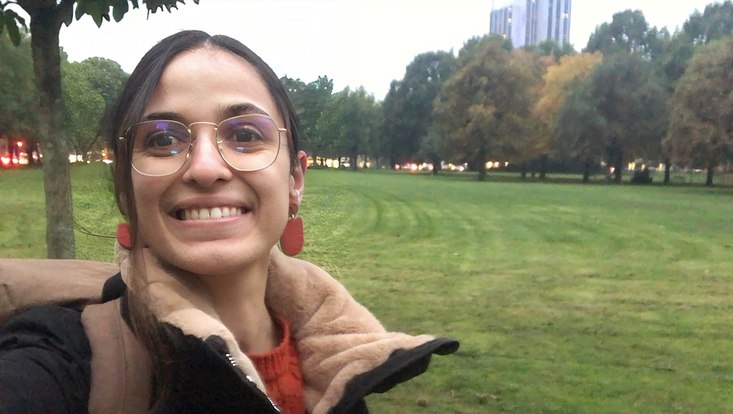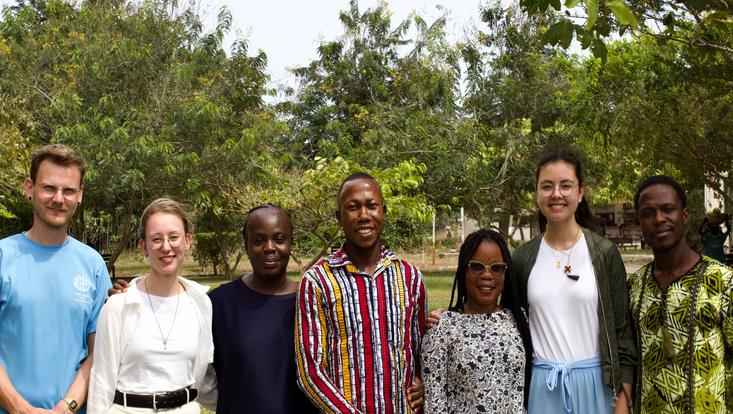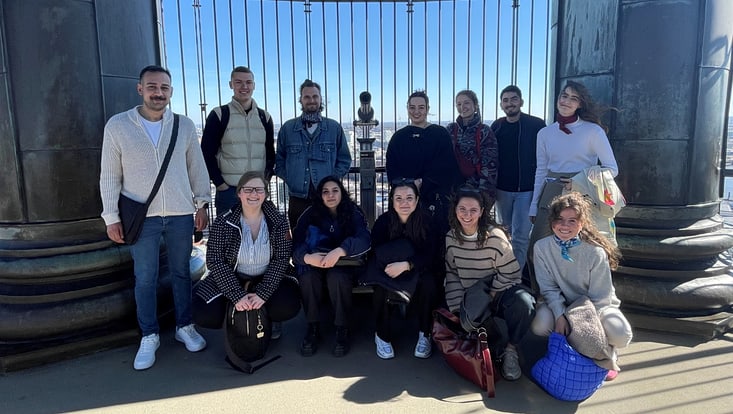Research, Connections and a Change of PerspectiveEin Interview mit Mafalda Leal Campos
17. November 2023

Foto: Campos
Wir sprachen mit Mafalda Leal Campos - Doktorandin und Gewinnerin des WERA Visiting Researcher Award 2023 aus Portugal. Sie ist derzeit zu einem 7-wöchigen Forschungsaufenthalt an der Universität Hamburg und war unter anderem Gastrednerin der LiDS Lunch Lecture zum Thema „Who I am and where I come from: Socio-affective components of learning in ethnic-racial minority and immigrant students and the role of language and literacy”.
Hi Mafalda! Thank you for meeting. Can you tell us a little bit about yourself? Where are you from?
I am a PhD Student from Portugal. I have a Bachelor’s degree in Psychology and a Master’s in Educational Psychology. I am currently doing my PhD at Ispa – Instituto Universitário, in Lisbon (Portugal), funded by the Foundation for Sciences and Technology (FCT). I am researching the role of ethnic identity in the adaptation of minority students in the Portuguese context, for which I am collecting data among youth in Portuguese schools, including Roma students and those from Portuguese-speaking African countries.
In May, I was awarded the WERA Visiting Researcher Award 2023 which allowed me to come to Hamburg.
What was your first impression of Hamburg?
Well, I am not going to lie, I am from Portugal and we are known as a very happy and warm people, which may also be due to the weather conditions we live in. Coming to Germany, I had all these stereotypes in my head of the cold, distant Germans. I was a bit afraid that my “energy” was going to be overwhelming to the people here. However, I have been well received by both the teams at IEA and Universität Hamburg. Everyone is open and the teams are also very international, so I felt very welcome.
I also made sure to find a dance group in Hamburg. I do swing dancing and was happy to find a great and welcoming community here in the city to enjoy my hobby with, which allowed me to meet friendly people fairly quickly as well.
How long are you at UHH for and what will you do during your time here?
My stay here is a cooperation between the Research Center LiDS at Universität Hamburg and IEA Hamburg (International Association for the Evaluation of Educational Achievement). It enables me to do research in Hamburg for seven weeks. I arrived in early October and am now in my third week here.
I am working on two research projects during my time here.
My first project is with IEA, which can be summed up as an international nonprofit and independent organization, comprising a network of national research institutions, governmental research agencies, scholars, and analysts who conduct large-scale comparative studies of education across the globe. In this project we are looking into affective gaps in math-related affective components of learning, using TIMSS 2019.
My second project is with Professor Ingrid Gogolin and Professor Thorsten Klinger and we aim to analyze the associations of multilingualism with students’ adjustment. It is based on a longitudinal study that was done at German schools, the MEZ study – Language Development in Diverse Settings
During my time here, I will also give a LiDS Lunch Lecture on the topic: “Who I am and where I come from: Socio-affective components of learning in ethnic-racial minority and immigrant students and the role of language and literacy”. This last part is a bit outside of my usual research area, but I am very happy to go further into this area of language learning and literacy in regard to minorities in addition to my own research focus.
Can you go into more detail on the research you are currently conducting?
In my PhD, I study the role of ethnic identity in the adaptation of ethnic minorities in Portugal. You can find out more about it on the website www.projetoie.com. This doesn’t include everything in the project since I am also conducting a systematic review, but you can get a good grasp on what I am doing and will be doing for the next couple of years.
Here in Hamburg, I am mostly focused on analyzing data on minorities (immigrants, ethnic groups) in schools and understanding what leads to an achievement gap in their education, what other gaps can be seen aside from achievement and what measures can be taken to avoid existing inequalities in education. I am focusing on students’ math achievement and checking what kind of gaps we observe for math-related affective components of learning. Currently, I am analyzing data to see whether there are cross-country socio-effective gaps in students with immigration backgrounds, as well as gaps by gender and SES. Socio-affective variables in education describe the relationship students have with learning, and I would say the main ones are motivation, self-efficacy, self-concept, school belonging… “internal” components which can highly affect school achievement.
Then I also have the project with Dr. Ingrid and Dr. Klinger, but here I am still exploring the dataset and defining my research strategy to propose in the following weeks.
That seems very interesting. What do you wish to have achieved when you are back home?
Firstly, I would like to be able to publish a paper on the work that I have been doing here in Hamburg. There are arrangements in place already for the research done at IEA and I hope to also be able to publish on the work I have done here at the university.
In addition to this rather “materialistic” goal, I strive to make connections with the people here in Hamburg. To exchange ideas, gain new ideas and change my perspective regarding my own area of research. I am already getting a lot of input and learning so much.
Is there any advice you wish to give to others who are considering coming to UHH?
Don’t think too much about it! You can decide what kind of experience you will have. Try to meet people in the work context but also outside of the academic bubble. Smile at people and be happy. Show people that you respect their culture and space and they will be very accommodating towards you. Additionally, I would of course advise people to explore the city and take advantage of the (international) events Hamburg has on offer.


